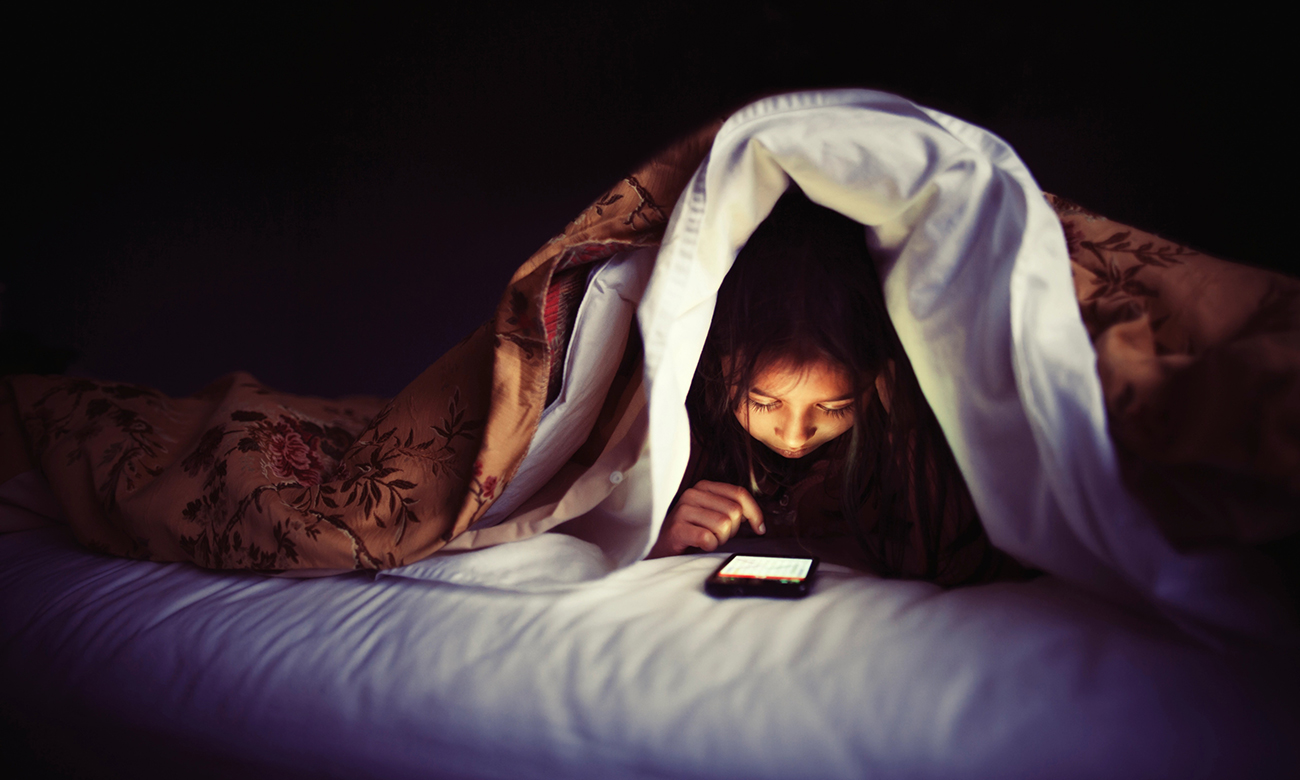
任何人都很难拒绝社交媒体通知的诱惑,研究表明,这种诱惑对青少年来说甚至更加强烈。位于英国莱斯特的德蒙特福特大学(De Montfort University)的一项新研究表明,12.5%的10岁儿童每周约少睡一个晚上的觉,因为他们会在半夜醒来查看通知。
这项研究由心理学讲师约翰·肖主持,研究对象是来自莱斯特市学校的60名10岁学生。平均而言,这组儿童每晚的睡眠时间约为8.7小时,低于美国疾病控制与预防中心(Centers for Disease Control and Prevention)为学龄儿童推荐的9小时至12小时睡眠时间。大多数人还承认,他们“每天使用社交媒体的时间超过4个小时,三分之二的人表示他们在睡前几小时都在刷社交媒体。”
“社交媒体引发的对错过新消息的恐惧直接影响了他们的睡眠。他们想知道他们的朋友在做什么,如果有事情发生时你不在线,就意味着你没有参与其中。”约翰·肖在上周的英国科学节(British Science Festival)上分享道。“这可能是一个反馈循环。如果你很焦虑,你就更有可能在刷社交媒体;因此,你会更加焦虑。你刷到的内容让大脑兴奋,也会延迟睡眠。”
在研究过程中,约翰·肖还强调了养成睡眠习惯的重要性,包括在睡前一小时关机,并使用防蓝光设备来保护眼睛。
睡眠不足会导致身体健康问题,例如2型糖尿病和肥胖,以及心理健康问题和注意力不集中。 美国疾病控制与预防中心建议将笔记本电脑、手机和电子游戏等电子设备放在卧室外。此外,专家建议即使是在周末,也要保持规律的就寝时间和起床时间;要保持卧室安静,温度舒适;以及要让孩子养成良好的睡眠习惯。(财富中文网)
译者:中慧言-王芳
任何人都很难拒绝社交媒体通知的诱惑,研究表明,这种诱惑对青少年来说甚至更加强烈。位于英国莱斯特的德蒙特福特大学(De Montfort University)的一项新研究表明,12.5%的10岁儿童每周约少睡一个晚上的觉,因为他们会在半夜醒来查看通知。
这项研究由心理学讲师约翰·肖主持,研究对象是来自莱斯特市学校的60名10岁学生。平均而言,这组儿童每晚的睡眠时间约为8.7小时,低于美国疾病控制与预防中心(Centers for Disease Control and Prevention)为学龄儿童推荐的9小时至12小时睡眠时间。大多数人还承认,他们“每天使用社交媒体的时间超过4个小时,三分之二的人表示他们在睡前几小时都在刷社交媒体。”
“社交媒体引发的对错过新消息的恐惧直接影响了他们的睡眠。他们想知道他们的朋友在做什么,如果有事情发生时你不在线,就意味着你没有参与其中。”约翰·肖在上周的英国科学节(British Science Festival)上分享道。“这可能是一个反馈循环。如果你很焦虑,你就更有可能在刷社交媒体;因此,你会更加焦虑。你刷到的内容让大脑兴奋,也会延迟睡眠。”
在研究过程中,约翰·肖还强调了养成睡眠习惯的重要性,包括在睡前一小时关机,并使用防蓝光设备来保护眼睛。
睡眠不足会导致身体健康问题,例如2型糖尿病和肥胖,以及心理健康问题和注意力不集中。 美国疾病控制与预防中心建议将笔记本电脑、手机和电子游戏等电子设备放在卧室外。此外,专家建议即使是在周末,也要保持规律的就寝时间和起床时间;要保持卧室安静,温度舒适;以及要让孩子养成良好的睡眠习惯。(财富中文网)
译者:中慧言-王芳
It’s hard for anyone to ignore the lure of a social media notification, and research is showing the temptation is even stronger for adolescents. A new study by De Montfort University Leicester in the U.K. suggests that 12.5% of 10-year-olds are losing about one night of sleep per week because they’re waking up in the middle of the night to check notifications.
The research, led by psychology lecturer John Shaw, involved 60 students, age 10, from schools within Leicester. On average, the group got about 8.7 hours of sleep per night, which is less than the nine to 12 hours the Centers for Disease Control and Prevention recommends for school-age children. The majority of the group also admitted to using social media for “more than four hours a day, with two-thirds saying they were using it in the hours before bedtime.”
“The fear of missing out, which is driven by social media, is directly affecting their sleep. They want to know what their friends are doing, and if you’re not online when something is happening, it means you’re not taking part in it,” Shaw shared at the British Science Festival last week. “And it can be a feedback loop. If you are anxious, you are more likely to be on social media; you are more anxious as a result of that. And you’re looking at something that’s stimulating and delaying sleep.”
During his session, Shaw also stressed the importance of establishing a sleep routine, which can include logging off your phone an hour before bedtime and using a blue-light filter to protect your eyes.
Lack of adequate sleep can lead to physical health issues, such as Type 2 diabetes and obesity, as well as mental health problems and trouble focusing. The CDC recommends keeping electronic devices, such as laptops, phones, and video games, outside the bedroom. Furthermore, experts suggest maintaining regular bedtimes and wake-up times, even on weekends; keeping bedrooms quiet and at a comfortable temperature; as well as modeling good sleep behaviors for children.






